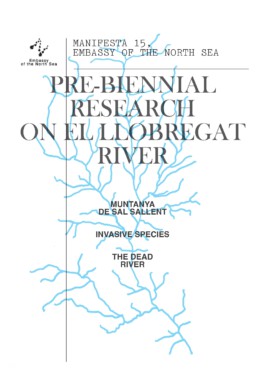
Manifesta Research – Pre-biannial Research
at Design Hub Barcelona
For the Pre-laminary Research of the Manifesta15 in Barcelona, I participated with the Embassy of the North Sea. With Sheng-Wen Lo and Harpo t’Hart,
We investigated at one of the three hubs designated by the Manifesta team. In our case, the Llobregat River. From here, we look at the delta, the middle flowing transition part and the source of the River. Fastly, the historical context of salt mines, today’s ICL potassium mines and the textile industrial appropriation of the river water became exposed.
For the exhibition at the Design Hub in Barcelona, we showed a portrait of the research, where the balance of conflict becomes part of the observer instead of a doctrine we propose.
Representation of non-human entities is not just a question of political or juridical representation. The term representation also refers to the way something is depicted, what stories we tell about it and what perspectives are deemed essential. So, in order to achieve a just political and juridical representation, we have to think about the aesthetic/ cultural representation. Through this lens of representation, we have looked at the Llobregat River. We have focused its research on the voices of non-human actors and their relation to the natural/urban environment in the Llobregat delta. The Llobregat Delta, suffering from drought and salinization, affects various sectors, including agriculture, industry, and the residents of Catalonia, both human and non-human. Our research began by exploring the physical, speculative, and spiritual connections between the inhabitants of the delta. In June 2023, Sheng-Wen Lo and Leon Lapa Pereira initiated their conversation with the river by getting close to key segments of the Llobregat basin, starting from the delta and progressing to the midstream Sallent, where the salt mountain
—the spoil heap from potash mining—is located, and then to the Baells reservoir near Berga. We have worked together with local ecologists, activists, including Miguel Cañedo (IDAEA), Núria (Tourist Office of Sallent), activist Annelies Broekman, as well as ecologists Josep Ribera and Enriqueta Codina.
“With the development of the industrial colonies, one after another, the Llobregat River came to be called the “most exploited river in the world”. Only in retrospect is it easier to appreciate this navel glaring. But the reputation of the Llobregat as a hard-working river, producing much with little, stuck in the minds of the Catalans. A “Llobregat mentality” entered the Catalan lexicon to describe someone able to maximise the exploitation of resources, no matter how small, for the maximum advantage.” Whose Quote?
Supported by the Manifesta15, pre-biennial research on El Llobregat river,
Embassy of the North Sea
Graphic Design: Corine Datema
© 2024, Sheng-Wen Lo, Leon Lapa Pereira & Harpo ’t Hart
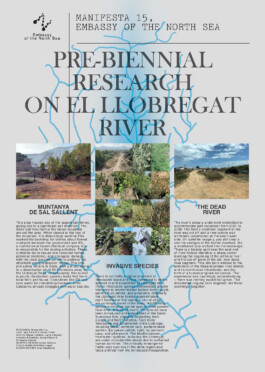
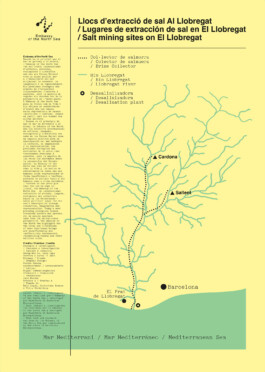
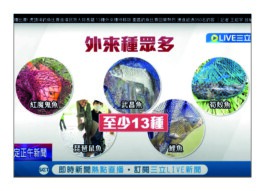
Give away cards for project ideas during the Pre-Biennial Manifesta exhibition
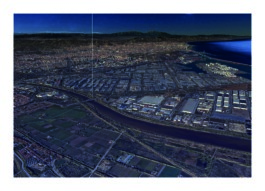
Give away cards for project ideas during the Pre-Biennial Manifesta exhibition
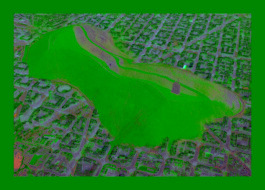
Give away cards for project ideas during the Pre-Biennial Manifesta exhibition
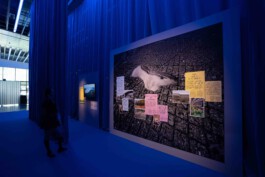
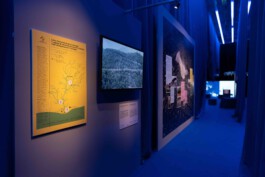
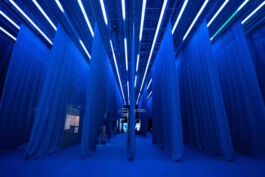
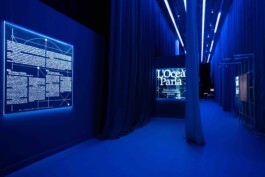
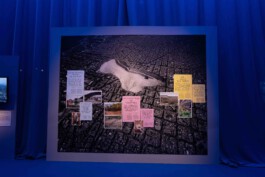
Exhibition views at Disseny Hub Barcelona, Spain, 2024
Exhibition views at Disseny Hub Barcelona, Spain, 2024
Exhibition views at Disseny Hub Barcelona, Spain, 2024
Exhibition views at Disseny Hub Barcelona, Spain, 2024
Exhibition views at Disseny Hub Barcelona, Spain, 2024

Manifesta Research – Pre-biannial Research
at Design Hub Barcelona
For the Pre-laminary Research of the Manifesta15 in Barcelona, I participated with the Embassy of the North Sea. With Sheng-Wen Lo and Harpo t’Hart,
We investigated at one of the three hubs designated by the Manifesta team. In our case, the Llobregat River. From here, we look at the delta, the middle flowing transition part and the source of the River. Fastly, the historical context of salt mines, today’s ICL potassium mines and the textile industrial appropriation of the river water became exposed.
For the exhibition at the Design Hub in Barcelona, we showed a portrait of the research, where the balance of conflict becomes part of the observer instead of a doctrine we propose.
Representation of non-human entities is not just a question of political or juridical representation. The term representation also refers to the way something is depicted, what stories we tell about it and what perspectives are deemed essential. So, in order to achieve a just political and juridical representation, we have to think about the aesthetic/ cultural representation. Through this lens of representation, we have looked at the Llobregat River. We have focused its research on the voices of non-human actors and their relation to the natural/urban environment in the Llobregat delta. The Llobregat Delta, suffering from drought and salinization, affects various sectors, including agriculture, industry, and the residents of Catalonia, both human and non-human. Our research began by exploring the physical, speculative, and spiritual connections between the inhabitants of the delta. In June 2023, Sheng-Wen Lo and Leon Lapa Pereira initiated their conversation with the river by getting close to key segments of the Llobregat basin, starting from the delta and progressing to the midstream Sallent, where the salt mountain
—the spoil heap from potash mining—is located, and then to the Baells reservoir near Berga. We have worked together with local ecologists, activists, including Miguel Cañedo (IDAEA), Núria (Tourist Office of Sallent), activist Annelies Broekman, as well as ecologists Josep Ribera and Enriqueta Codina.
“With the development of the industrial colonies, one after another, the Llobregat River came to be called the “most exploited river in the world”. Only in retrospect is it easier to appreciate this navel glaring. But the reputation of the Llobregat as a hard-working river, producing much with little, stuck in the minds of the Catalans. A “Llobregat mentality” entered the Catalan lexicon to describe someone able to maximise the exploitation of resources, no matter how small, for the maximum advantage.” Whose Quote?
Supported by the Manifesta15, pre-biennial research on El Llobregat river,
Embassy of the North Sea
Graphic Design: Corine Datema
© 2024, Sheng-Wen Lo, Leon Lapa Pereira & Harpo ’t Hart



Give away cards for project ideas during the Pre-Biennial Manifesta exhibition

Give away cards for project ideas during the Pre-Biennial Manifesta exhibition

Give away cards for project ideas during the Pre-Biennial Manifesta exhibition





Exhibition views at Disseny Hub Barcelona, Spain, 2024
Exhibition views at Disseny Hub Barcelona, Spain, 2024
Exhibition views at Disseny Hub Barcelona, Spain, 2024
Exhibition views at Disseny Hub Barcelona, Spain, 2024
Exhibition views at Disseny Hub Barcelona, Spain, 2024
ImPRINT
This website is the online portfolio of Leon Lapa Pereira. Content may not be used without crediting the author.
© 2025 Leon Lapa Pereira, all rights reserved.
Copyright: The works shown, as well as this website, are for informational purposes only and may not be used for other purposes without the author’s permission.
Disclaimer: Despite careful content control, no liability is assumed for the content of external links. The responsibility for the content of linked pages lies solely with their operators.
Design and Website by Moritz Kreul
PRIVACY POLICY
The responsible party for data processing on this website is
Aris Leon Lapa Pereira
Marceliststraat 128
2586RZ Den Haag
Nederland
KVK-nummer: 74953885
E-mail: mail@leonlapapereira.com
Gegevens volgens art. 3:15d BW en Telecommunicatiewet
De verantwoordelijke instantie beslist alleen of samen met anderen over de doeleinden en middelen van de verwerking van persoonsgegevens (bijv. namen, contactgegevens e.d.).
Uw rechten onder de AVG
Beveiliging
Deze website gebruikt SSL/TLS-versleuteling voor de beveiliging van dataoverdracht. Dit herkent u aan "https://" in de adresbalk en het slot-icoontje in uw browser.
Externe diensten
YouTube & Vimeo: Op deze website kunnen video’s van YouTube en Vimeo geïntegreerd zijn. Bij het afspelen kan het betreffende platform cookies plaatsen en gegevens (zoals IP-adres, browsergegevens) verwerken. Meer informatie vindt u in hun privacyverklaringen:
Google Analytics: Voor statistische analyse kan Google Analytics worden gebruikt. Dit gebeurt alleen met uw expliciete toestemming (art. 6 lid 1 a AVG). Meer info: https://policies.google.com/privacy
ImPRINT
This website is the online portfolio of Leon Lapa Pereira. Content may not be used without crediting the author.
© 2025 Leon Lapa Pereira, all rights reserved.
Copyright: The works shown, as well as this website, are for informational purposes only and may not be used for other purposes without the author’s permission.
Disclaimer: Despite careful content control, no liability is assumed for the content of external links. The responsibility for the content of linked pages lies solely with their operators.
Design and Website by Moritz Kreul
PRIVACY POLICY
The responsible party for data processing on this website is
Aris Leon Lapa Pereira
Marceliststraat 128
2586RZ Den Haag
Nederland
KVK-nummer: 74953885
E-mail: mail@leonlapapereira.com
Gegevens volgens art. 3:15d BW en Telecommunicatiewet
De verantwoordelijke instantie beslist alleen of samen met anderen over de doeleinden en middelen van de verwerking van persoonsgegevens (bijv. namen, contactgegevens e.d.).
Uw rechten onder de AVG
Beveiliging
Deze website gebruikt SSL/TLS-versleuteling voor de beveiliging van dataoverdracht. Dit herkent u aan "https://" in de adresbalk en het slot-icoontje in uw browser.
Externe diensten
YouTube & Vimeo: Op deze website kunnen video’s van YouTube en Vimeo geïntegreerd zijn. Bij het afspelen kan het betreffende platform cookies plaatsen en gegevens (zoals IP-adres, browsergegevens) verwerken. Meer informatie vindt u in hun privacyverklaringen:
Google Analytics: Voor statistische analyse kan Google Analytics worden gebruikt. Dit gebeurt alleen met uw expliciete toestemming (art. 6 lid 1 a AVG). Meer info: https://policies.google.com/privacy
Aris Leon Lapa Pereira (he/him) is a cross-disciplinary performance researcher exploring the boundaries of performative life. Deeply embedded in the landscape of Artistic Research, his personal practice is consistently informed by philosophical inquiry. By merging mechanical and technical knowledge with performative elements, he engages with multiple disciplines with genuine enthusiasm.
Currently focused on the de-romanticisation of nature, Leon investigates the Rights of Nature—specifically, the rights of water—in collaboration with the Embassy of the North Sea. Through this partnership, he co-founded the Confluence of European Water Bodies, a growing network of activist organisations that support his research into intercultural relationships and intimate connections with water.
Alongside this, he is a curator at the Instrument Inventors Initiative (iii) and co-founder of the WASTELAND Festival, where he leads research and performance curation through an ecological lens. Co-creation and collaboration are not just professional principles for Leon, but also sociological commitments—central to his Resonant Bodies Residencies, where these concepts are deeply explored.
For Leon, co-living is a vital practice that is increasingly endangered by today’s polycrisis. He is, therefore, continually seeking methods and tools to cultivate honest, careful, and communal environments.
Aris Leon Lapa Pereira (he/him) is a cross-disciplinary performance researcher exploring the boundaries of performative life. Deeply embedded in the landscape of Artistic Research, his personal practice is consistently informed by philosophical inquiry. By merging mechanical and technical knowledge with performative elements, he engages with multiple disciplines with genuine enthusiasm.
Currently focused on the de-romanticisation of nature, Leon investigates the Rights of Nature—specifically, the rights of water—in collaboration with the Embassy of the North Sea. Through this partnership, he co-founded the Confluence of European Water Bodies, a growing network of activist organisations that support his research into intercultural relationships and intimate connections with water.
Alongside this, he is a curator at the Instrument Inventors Initiative (iii) and co-founder of the WASTELAND Festival, where he leads research and performance curation through an ecological lens. Co-creation and collaboration are not just professional principles for Leon, but also sociological commitments—central to his Resonant Bodies Residencies, where these concepts are deeply explored.
For Leon, co-living is a vital practice that is increasingly endangered by today’s polycrisis. He is, therefore, continually seeking methods and tools to cultivate honest, careful, and communal environments.